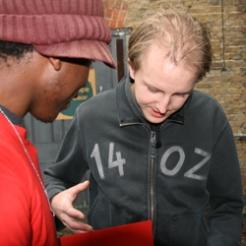The Institute of Fundraising summit on face-to-face has ended with the declaration that charities need to ‘own’ the issues around standards monitoring and site allocation and a claim that the PFRA board suffers from a conflict of interest.
Following a two-hour meeting involving around 30 charity directors of fundraising yesterday, the Institute of Fundraising – which convened the summit – said charities are keen to address the issues of face-to-face fundraising standards, monitoring, training and how street-fundraising sites are allocated.
“We’re really not convinced there is enough monitoring of practice. We had absolute consensus that there’s not enough mystery shopping. We were feeling that charities need to get a grip on this, our members need to get a grip on this,” said Peter Lewis, chief executive of the Institute.
The meeting was held without the Public Fundraising Regulatory Association’s involvement, and while Lewis said that the Institute has engaged with the PFRA following the summit, this is an issue which needs to be owned by charities.
Conflict of interest on boards
“We are concerned about the inherent conflict of interest on the PFRA board, having the agencies on there, but at the same time we have a recognition that we need to engage with the agencies to make this work,” said Lewis.
"But it’s really the charities' responsibility. The people out there on the street are the charities’ representatives."
Ian MacQuillin, head of communications at the PFRA, categorically refused the notion that there is a conflict of interest on the board.
“We have no more of a conflict of interest at the PFRA than the Institute do in having Stephen Pidgeon as chair of its Standards Committee,” he said.
“We have an in-built majority of charities into the governance process of our board. Agencies cannot have a majority on our board. Most of our income comes from charities. We are a charity-led organisation.”
Peter Lewis is due to attend a PFRA board meeting tomorrow to discuss how the PFRA, Institute and charities will work together going forward.
Monitoring and allocations
The summit was prompted by a Daily Telegraph exposé of poor fundraising practice at the Tag agency, but also follows the admission by the PFRA itself that its own monitoring has shown that street fundraising standards have fallen over the past few years.
On the subject of whether there is enough monitoring of face-to-face standards, Lewis said that monitoring would not be something for the Institute to take control of, but emphasised there was broad agreement that “more needs to be done”.
MacQuillin said that the PFRA has a robust system in place, but that some charities may not do significant amounts of independent quality checks on their fundraising teams.
“We have a full-time compliance officer and we’re looking at recruiting another one. We do a lot of monitoring. We have a rulebook that’s coming on. We have a comprehensive quality control programme which is robust and when it launches, on August 20, will do the job,” said MacQuillin.
Allocating sites for face-to-face fundraising is the PFRA’s raison d’etre, according to MacQuillin, but following the Institute’s summit the issue of allocations is also something groups will be looking into.
Lewis said: “I think we need to look at it. There was just a strong feeling that charities need to get a hold of it themselves. Obviously the agencies and the PFRA are part of the picture, but really the charities need to own all of this and be comfortable with it.”
PFRA warns of duplication
MacQuillin, however, said the PFRA is best-placed to continue its control of the allocations process. “Allocations is what we do. We have the expertise in this. We have relationships with 46 councils, the Local Government Association and the Association of Town Centre Management,” he said. “We’re spending a lot of money at the moment reviewing our site allocation process to make it fairer for all types of players. If the Institute of Fundraising has views on that, then that’s great.”
The PFRA head of communications warned that if the Institute started working groups on the subject of allocations, this would likely have the same people and general structure as the PFRA’s own group which meets to discuss site allocations.
“We’ll end up duplicating work, and our work will be better because we’ve been doing it for ten years,” said MacQuillin.
PFRA did, however, commend the Institute on pulling together fundraising senior brass to discuss the subject of face-to-face fundraising.
“I’m really pleased that a load of directors came along to this meeting because a lot of directors of fundraising haven’t taken as much interest in face-to-face fundraising as they could have done,” MacQuillin said.
“If we’d had this level of involvement from senior fundraisers two years ago with Newsnight, we might not have needed to have this summit meeting now.”









